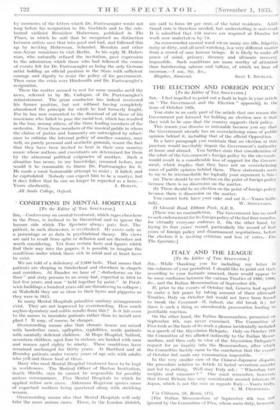CONDITIONS IN MENTAL HOSPITALS [To the Editor of THE SPECTATOR.]
Sin,—Controversy on mental treatment, which rages elsewhere in the Press, is inclined to be theoretical and to ignore the human side which The Spectator always puts first. The patient, in such discussion, is overlooked. He exists only as
a percentage or as data in psychiatrical theory. His views are said to result from spite or delusion and are therefore not worth considering. Yet from certain facts and figured which find their way into the papers, it is possible to imagine the' conditions under which those sick in mind and at heart have to exist.
We are told of a deficiency of 2,000 beds. That means that patients are sleeping in Sunderland and elsewhere in chapels and corridors. At Dundee we hear of ," shakedowns on the floor " and sixty persons to an army-hut, expected in 1918 to last five years, and now " held together by paint." At Prest- wich buildings a hundred years old are threatening to collapse ; at Wakefield they are as close to their byres and piggeries as they were in 1815.
In many Mental Hospitals primitive sanitary arrangements exist. They are not improved by overcrowding. How much
asylum dysentery and colitis results from this ? Is it fair even to the nurses to inoculate patients rather than to install new plant ? It may, of course, be cheaper.
Overcrowding means also that chronic insane are mixed with borderline cases, epileptics, syphilitics, senile patients with mentally deficient children. At Hope Hospital, Salford, seventeen children, aged four to sixteen, are herded with men and women aged eighty to ninety. These conditions have remained unchanged for thirty years. At Dartford and at Bromley patients under twenty years of age mix with adults who yell and throw food at them.
Many who need.Mental Hospital treatment have to be kept in workhouses. The Medical Officer of Halton Institution, South Shields, says he cannot be responsible for possibly serious consequences. Five Mental Hospitals to which he applied refuse new cases. Alderman Rogerson quotes cases of expectant mothers being quartered along with shrieking women.
Overcrowding means also that Mental Hospitals will only take the more serious cases. These,. in the London district, are said to form 80 per cent, of the total residents. Addi- tional care is therefore needed, but understaffing is universal. It is admitted that 150 nurses are required at Dundee for work now undertaken by 74.
An overcrowded mental ward where many are idle, fidgetty, noisy or dirty, and all need watching, is a very different matter from a crowd of sane human beings. It is likely to make all peace of mind, privacy, decency and ultimate . recovery impossible. Such conditions are more worthy of attention than hairdressing saloons and talkies, of which we hear ad nauseam.—I am, Sir,


























































 Previous page
Previous page